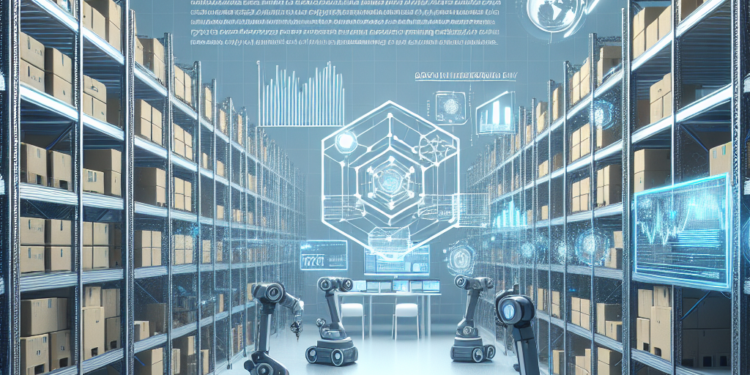Artificial intelligence (AI) has revolutionized many industries, including warehouse management. With its ability to analyze vast amounts of data and make intelligent decisions, AI has the potential to optimize warehouse operations and improve efficiency. In this case study, we will explore how AI is being used in warehouse management and the benefits it brings to the industry.
The Challenge
Warehouse management is a complex and demanding task. Warehouse managers must juggle multiple responsibilities, such as inventory management, order picking, and shipping logistics, while ensuring that operations run smoothly and efficiently. With the rise of e-commerce and the increasing demand for fast and accurate order fulfillment, warehouse managers face the added challenge of meeting customer expectations for quick delivery times and accurate orders.
Traditional warehouse management systems rely on manual processes and human decision-making, which can lead to errors and inefficiencies. For example, human errors in order picking can result in mispicked items and delayed shipments, leading to customer dissatisfaction and increased costs for the warehouse. In addition, manual inventory management can be time-consuming and prone to inaccuracies, leading to stockouts or overstocked items.
The Solution
AI offers a solution to these challenges by automating and optimizing warehouse operations. By using AI algorithms to analyze data and make intelligent decisions, warehouse managers can improve efficiency, reduce errors, and enhance customer satisfaction. AI technologies such as machine learning, deep learning, and natural language processing can be used to automate tasks such as inventory forecasting, order picking, and route optimization, leading to cost savings and increased productivity.
For example, AI can be used to analyze historical sales data and predict future demand, helping warehouse managers to optimize inventory levels and prevent stockouts. AI-powered robots can be used to automate order picking and packing, reducing the time and labor required for these tasks. AI algorithms can also be used to optimize shipping routes and schedules, minimizing transportation costs and improving delivery times.
Case Study: Alibaba’s AI-Powered Warehouse
One example of AI in warehouse management is Alibaba’s AI-powered warehouse in China. The e-commerce giant has invested heavily in AI technology to improve the efficiency of its warehouse operations and enhance customer satisfaction. Alibaba’s warehouse is equipped with AI-powered robots that can navigate the warehouse floor, pick up items, and deliver them to packing stations. These robots are equipped with sensors and cameras that allow them to navigate the warehouse environment safely and avoid obstacles.
Alibaba’s AI algorithms analyze data from sensors and cameras to optimize the movement of robots and maximize efficiency. The algorithms can predict the best route for each robot to take, taking into account factors such as item weight, distance to the destination, and traffic conditions. This helps to reduce the time required for order picking and packing, leading to faster order fulfillment and improved customer satisfaction.
In addition to order picking, Alibaba’s AI-powered warehouse also uses AI algorithms to optimize inventory management. The algorithms analyze historical sales data and predict future demand, helping warehouse managers to optimize inventory levels and prevent stockouts. This reduces the risk of overstocked items and ensures that popular items are always in stock, leading to increased sales and reduced holding costs.
The Results
The results of Alibaba’s AI-powered warehouse have been impressive. By implementing AI technology in its warehouse operations, Alibaba has been able to increase efficiency, reduce errors, and improve customer satisfaction. The AI-powered robots have significantly reduced the time required for order picking and packing, leading to faster order fulfillment and reduced labor costs. The AI algorithms used for inventory management have helped to optimize inventory levels and prevent stockouts, leading to increased sales and reduced holding costs.
In addition, the AI algorithms used to optimize shipping routes and schedules have helped to minimize transportation costs and improve delivery times. This has led to increased customer satisfaction and repeat business. Overall, the AI-powered warehouse has helped Alibaba to improve its competitiveness in the e-commerce market and maintain its position as a market leader.
The Future of AI in Warehouse Management
The success of Alibaba’s AI-powered warehouse is just one example of how AI is transforming the warehouse management industry. As AI technology continues to evolve and become more sophisticated, the potential for AI to revolutionize warehouse operations will only grow. The benefits of AI in warehouse management are clear: increased efficiency, reduced errors, improved customer satisfaction, and cost savings.
In the future, we can expect to see more warehouses adopting AI technology to automate and optimize their operations. AI-powered robots will become more common in warehouses, helping to automate tasks such as order picking, packing, and inventory management. AI algorithms will be used to analyze data and make intelligent decisions, leading to more efficient warehouse operations and improved customer satisfaction.
As AI technology continues to advance, warehouse managers will need to adapt to the changing landscape of warehouse management. Those who embrace AI technology and leverage its benefits will be able to stay ahead of the competition and thrive in the increasingly digital and competitive world of warehouse management. The future of warehouse management is AI, and those who embrace it will reap the rewards of increased efficiency, reduced errors, and improved customer satisfaction.
In conclusion, AI has the potential to transform warehouse management and revolutionize the industry. By automating and optimizing warehouse operations, AI technology can help warehouse managers to improve efficiency, reduce errors, and enhance customer satisfaction. The success of companies like Alibaba in implementing AI in warehouse management is a testament to the power of AI technology in transforming the industry. As AI technology continues to evolve, we can expect to see more warehouses adopting AI technology to automate and optimize their operations. Those who embrace AI technology and leverage its benefits will be able to stay ahead of the competition and thrive in the increasingly digital and competitive world of warehouse management. The future of warehouse management is AI, and the future is bright.













